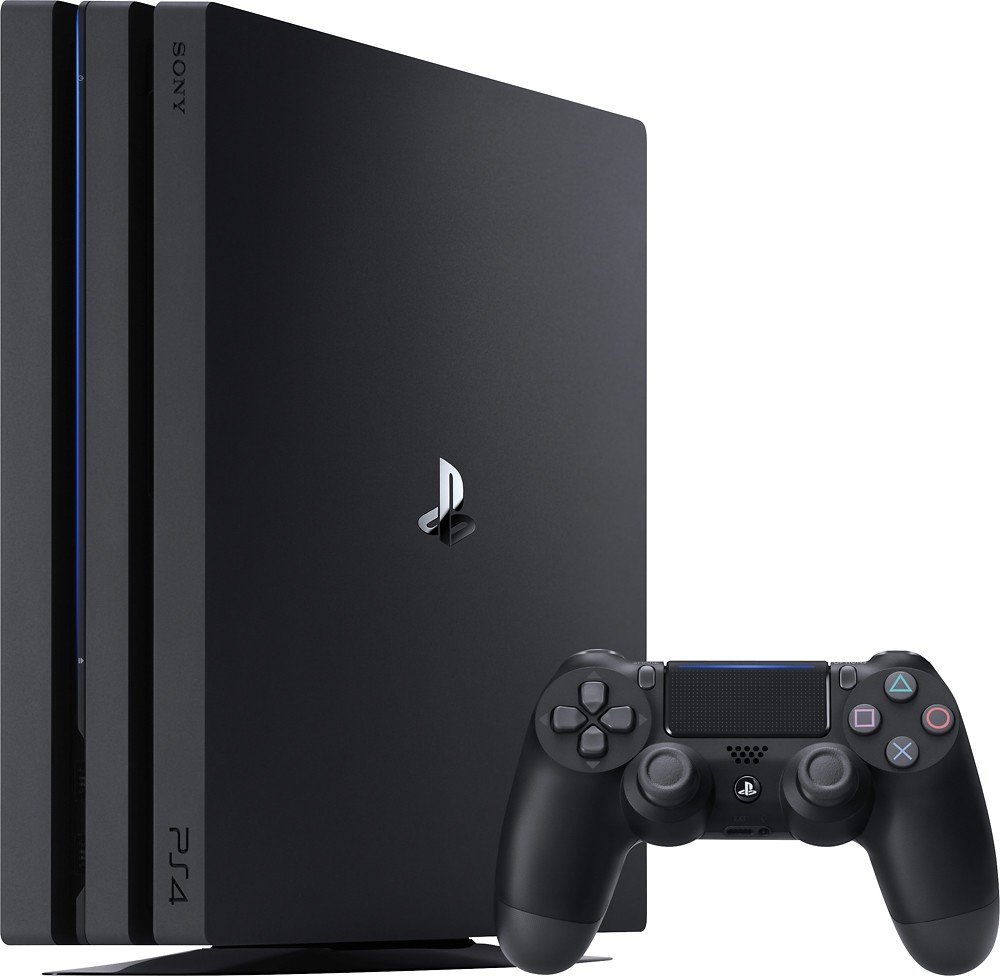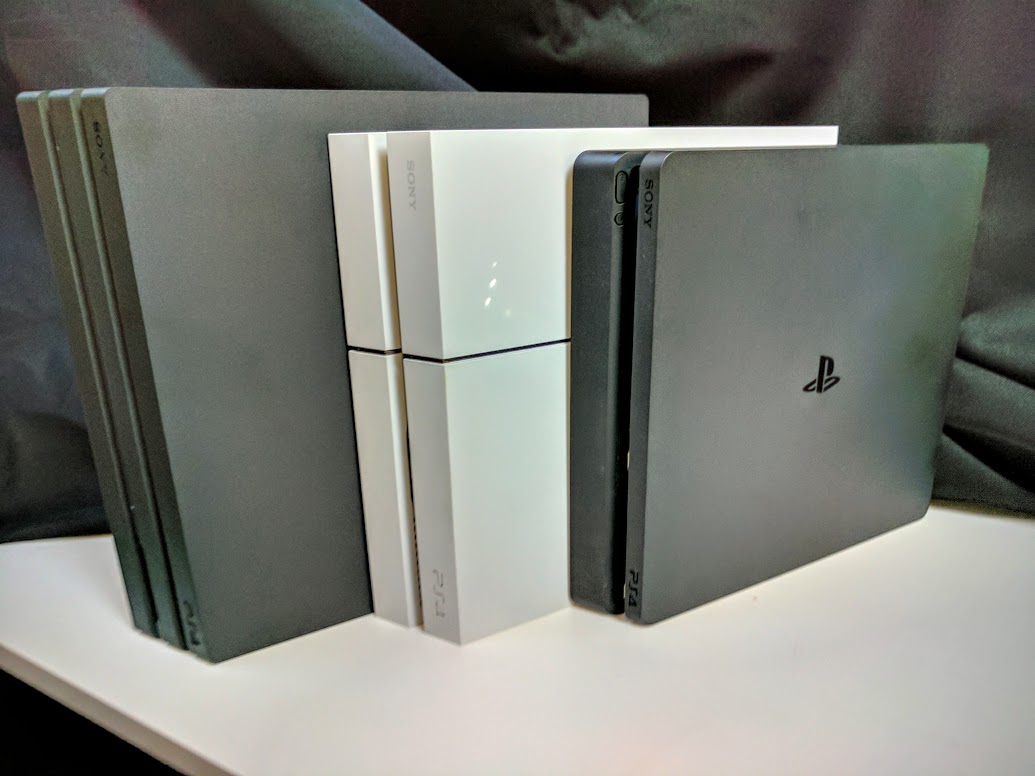We're a virtual company made up of tech experts from across the globe, but we're also avid gamers who love getting the best experience at the best price. After hundreds of hours with these consoles, we've found the best picks for you.
PlayStation 4 Slim
Budget-friendly
Pros
- Fits just about anywhere
- Whisper quiet
- Inexpensive
Cons
- No 4K support
The slimmer PlayStation 4 plays every game with ease, but the lack of 4K output is noticeable if your TV supports it.
PlayStation 4 Pro
4K Ready
Pros
- 4K HDR gaming looks incredible on everything
- PlayStation VR performance is best on this PS4
Cons
- Noticeably larger
- Can get loud during intense gameplay
If you want the best possible PlayStation experience, this is the one to buy.
Sony offers two versions of the PlayStation 4 without sacrificing a ton of features with either. You're really just choosing between a great gaming experience and a greater gaming experience here.
What's the difference?
Sony has a history of releasing a "slim" version of the PlayStation a couple of years after its initial release. In the past, those consoles have been labeled a little differently at launch to make it easier to tell the new version apart from the old one. These slimmer versions typically offer more a physical difference than a functionality difference, and this year is no different. The significant feature and performance difference comes with the PlayStation 4 Pro, and even then the difference isn't huge unless you own a 4K television with HDR support.
| Category | PlayStation 4 Slim (2016) | PlayStation 4 Pro |
|---|---|---|
| Price | $269 | $399 |
| Dimensions | 10.43in x 11.34in x 1.54in | 11.61in x 12.87in x 2.17in |
| CPU | AMD Jaguar 8-core (x86-64) | AMD Jaguar 8-core (x86-64) |
| GPU | AMD Radeon (1.84 TFLOP) | AMD Radeon (4.2 TFLOP) |
| Storage | 500GB / 1TB | 1TB / 2TB |
| Optical out | No | Yes |
| WiFi | 802.11b/g/n (2.4GHz + 5GHz) | 802.11b/g/n (2.4GHz + 5GHz) |
| AV out | HDMI 1.4 | HDMI 2.0 |
| Power consumption | 165w max | 310w max |
| 4K Streaming | No | Yes |
| USB | USB 3.0 (x2 ) | USB 3.0 (x3) |
| PSVR support | Yes | Yes (Enhanced) |
The biggest functional difference between the original PS4 and the new slimmer PS4 is power consumption. Sony claims the new PS4 has a max power draw of 165 watts, which sounds impressive next to the original 250w max of the first PS4 until you see most benchmarks. The original PlayStation 4 had an average power draw of 150w during its heaviest gameplay sessions, and never pushed anywhere near that 250w max. It is slightly smaller though, so there's that.
PlayStation VR performance is something altogether different.
As you can see, Sony is using the same CPU and a GPU that's a little more than twice the performance in the new PlayStation 4 Pro. There's also an updated version of the HDMI standard in the PS4 Pro, but there's no immediate difference in performance out of the box for video output. Games that struggled in the past to maintain 30fps or 60fps on a standard PlayStation 4 will be able to offer a more consistent experience with the PlayStation 4 Pro through its "boost mode" feature. This basically means games that appear a to stutter a little on a normal PS4 will look and play smoother on a PS4 Pro.
Understanding 4K and HDR on PlayStation
PlayStation 4 Pro also offers 4K video streaming and enhanced graphics on supported titles. Game developers will have the option to offer higher quality graphics to PlayStation 4 Pro gamers, which will be clearly labeled with PS4 Pro Enhanced on the box. Not only are most new PlayStation games being made to support this Enhanced ability, many of the more popular games from the past year are releasing updates to look better through the more capable console.
Take a look at every PS4 Pro Enhanced game you can buy today!
As for HDR support, while all of these consoles are technically capable of outputting HDR visuals thanks to a software update from Sony, the HDR content offered by almost every app and game doesn't apply to anything but the Pro. HDR is typically tied to either 4K content or PS4 Enhanced content, neither of which will play on these older consoles.
| Category | PS4 Slim (2016) | PS4 Pro |
|---|---|---|
| HDR Output | 🤔 | ✔️ |
| 4K Streaming | ❌ | ✔️ |
| Remote Play | 720p | 1080p |
| Share Play | 720p | 1080p |
What about PlayStation VR?
PlayStation VR performance is something altogether different. PlayStation 4 Pro was built to better support PlayStation VR (You know, Project Morpheus and PlayStation Neo kinda go together and all that) but even here the differences are subtle on many titles.
Most titles that were available before the Pro was released look slightly better on the Pro, and those titles updated to support the enhanced graphics in the Pro are noticeably better looking than on the standard PS4. Because of the high focus on framerate in PlayStation VR, what you'll see in Pro Enhanced titles is more detail, not smoother transitions like you'd see on the television.
PlayStation 4 Slim
Budget-friendly
The slimmer PlayStation 4 plays every game with ease, but the lack of 4K output is noticeable if your TV supports it.
PlayStation 4 Pro
Powerhouse
If you want the best possible PlayStation experience, this is the one to buy.
Update August 2018: This article has been updated with new information on PlayStation 4 updates and new bundles available for the current models.



0 Response to "You Can See More: PlayStation 4 Slim vs. PlayStation 4 Pro: Which should you buy?"
Post a Comment